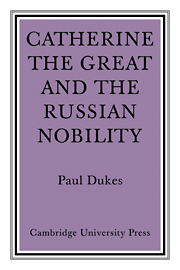 Catherine the Great and the Russian Nobilty
Catherine the Great and the Russian Nobilty 6 - Catherine the Great and the Russian nobility
Published online by Cambridge University Press: 31 March 2010
Summary
THE SIGNIFICANCE OF THE LEGISLATIVE COMMISSION
The principal reason for the suspension of the activities of the general assembly of the Legislative Commission was probably the official one, the outbreak of war with Turkey. However, it was not so much the preoccupation of the deputies with the Turkish War as that of the Empress herself that caused the curtailment of the commission, for, while Sergeevich accepted the decree of dissolution at its face value, pointing out the large number of deputies who held military rank, Lipinskii observed that fewer deputies actually left the Commission at the beginning of the war than at the transfer of the Commission from Moscow to St Petersburg, and therefore did not consider the closure of the general assembly a military necessity.
The Commission as a whole was now moribund, although continued appointment and election of deputies to it and reference to it in later legislation reflected some uncertainty on the matter of both people and government. It was not until 1774, however, that a more definite conclusion was given to the Commission with a decree ordering the disbandment of the committees and sub-committees. The explanation put forward on this occasion, to allow deputies to go home to pursue ‘useful domestic tasks’, strongly suggests that there were reasons for the break-up of the Commission other than those contained in official announcements.
- Type
- Chapter
- Information
- Catherine the Great and the Russian NobiltyA Study Based on the Materials of the Legislative Commission of 1767, pp. 218 - 252Publisher: Cambridge University PressPrint publication year: 1967


